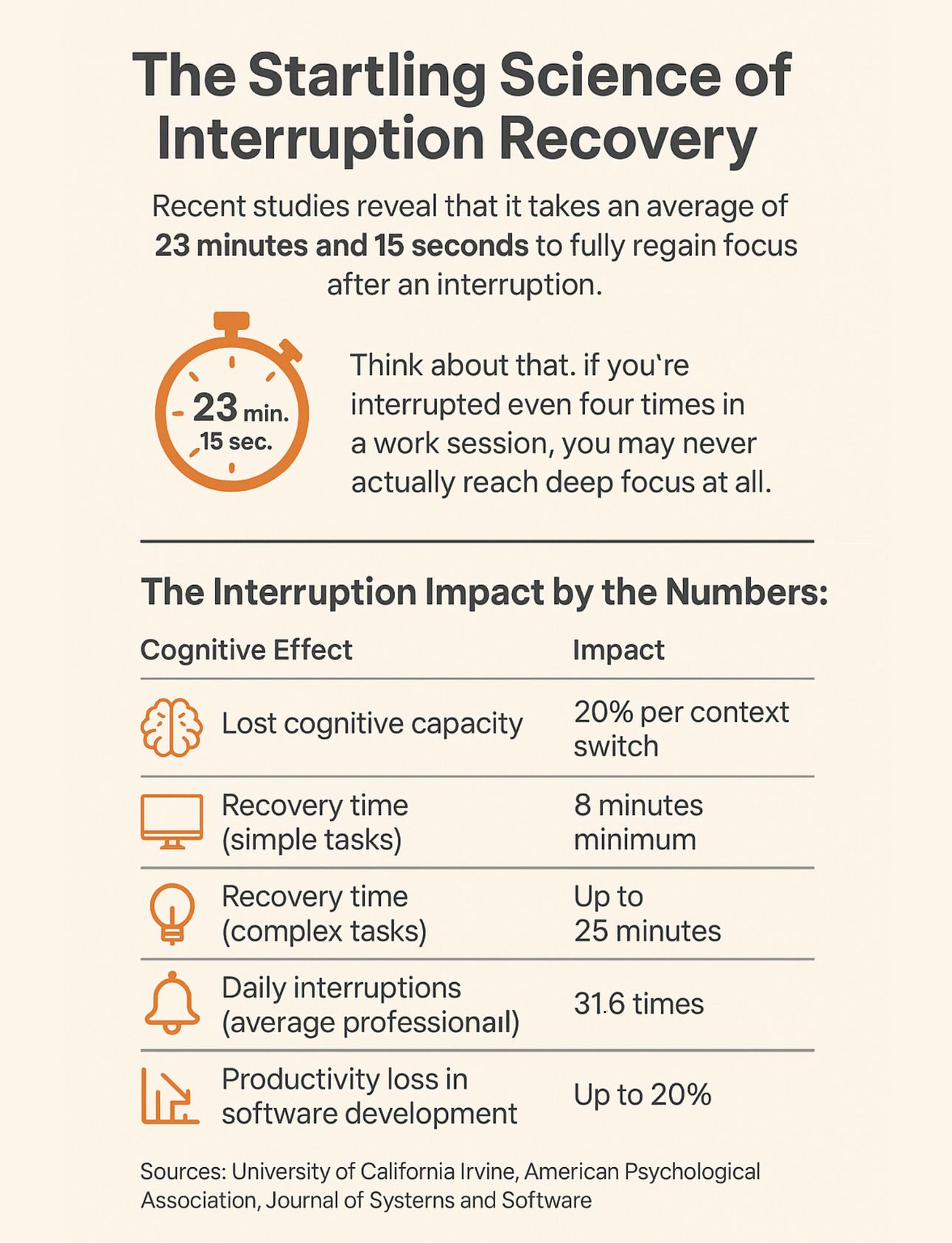- Flow State Mom- A Space for Moms
- Posts
- How to Stop Constant Interruptions as a Mom
How to Stop Constant Interruptions as a Mom
7 Science-Backed Strategies to Reclaim Your Focus

That Familiar Tug on Your Sleeve (Again) 😤
Picture this: You've finally sat down to tackle that important project, your mind is clear, and you're hitting your stride. Then it happens. "Mom, where's my blue shirt?" followed immediately by "Can I have a snack?" and before you can even process the first question, your phone buzzes with a text that "needs an immediate response."
Sound familiar? If you're a mom trying to reclaim your focus while navigating life with constant interruptions, you're not imagining the struggle - you're experiencing one of the most significant challenges of modern motherhood. Research from UC Irvine shows the average office worker is interrupted every 12 minutes and 40 seconds, but for moms? The interruptions come much faster and more frequently.
Whether it's little hands tugging at your shirt, teenagers needing "urgent" answers to non-urgent questions, or partners asking where things are located, constant interruptions don't just break your concentration - they're literally rewiring your brain's ability to focus deeply.
But here's the empowering truth: you can reclaim your focus without feeling guilty, teach your family when interruptions are appropriate, and create a household system that protects everyone's mental space. (If you're struggling with mom guilt about setting these boundaries, here's how to overcome those overwhelming "should" thoughts.) Let's explore how science-backed strategies can help you find your flow state, even in a house full of people who love you (and apparently need you every 3.7 minutes). ✨
Before we dive into solutions, let's understand what's really happening in your brain when you're constantly interrupted. This isn't just about lost time - it's about lost mental capacity.
📊 The Interruption Impact by the Numbers:

Interruption recovery infographic: 23 minutes needed to regain focus after interruption, with data on cognitive impact including 20% capacity loss and up to 25 minute recovery times for complex tasks.
Why Mom-Interruptions Feel So Intense 🌪️
🧠 Attention Residue
University of Washington research reveals that when we're interrupted, part of our attention remains focused on the interrupted task - a phenomenon called "attention residue." This means you're never giving full cognitive resources to either the interrupting request OR your original task.
⚡ The Mom Context-Switch Tax
Unlike workplace interruptions that might be similar in nature, mom-interruptions require massive mental pivots:
From quarterly budget analysis to "Can you open this pickle jar?"
From important emails to mediating sibling disputes
From creative work to finding lost homework folders
🎭 The Emotional Load
Mom interruptions aren't just cognitive - they're emotional. Each "Mom!" comes with an implicit expectation that you'll drop everything and solve the problem immediately, creating guilt when you can't and frustration when you do.

Mother and young daughter having a calm conversation at home office desk with laptop, demonstrating positive family communication and boundary setting. Child holds stuffed animal while mom practices mindful interaction, illustrating strategies for managing interruptions during work time.
The Science-Backed Solution: Strategic Interruption Management 🔬
Here's what the research tells us: when people reduced notification-caused interruptions, they experienced both higher performance and lower levels of irritation. The key isn't eliminating all interruptions (impossible with kids), but creating strategic systems that minimize unnecessary ones and manage necessary ones better.
What Successful Interruption Management Looks Like:
For Your Brain:
Decreased stress hormones and improved decision-making capacity
Better memory retention and information processing
Increased satisfaction with completed tasks
For Your Family:
Children develop crucial waiting and self-regulation skills
Reduced household tension and frustration
Better communication patterns that serve kids into adulthood
For Your Relationships:
Partners learn to respect focus time boundaries
Children feel more secure with predictable interaction patterns
Everyone experiences less guilt and resentment
7 Science-Backed Strategies to Reclaim Your Focus 🌟
Ready to create a household system that protects your mental space while teaching valuable life skills? These strategies are designed for real families with real needs.
1. The Interruption Hierarchy System 🚨
Time needed: 2 minutes to establish, ongoing practice
Best for: Families with children ages 3+
How it works: Create clear categories of when interruptions are always okay vs. when they should wait:
🔴 RED (Immediate): True emergencies only
Someone is hurt or bleeding
Something dangerous is happening
Genuine urgent bathroom needs
🟡 YELLOW (Wait for Break): Important but not urgent
Can't find something needed for school/activities
Sibling conflicts that aren't physical
Questions about plans or schedules
🟢 GREEN (Wait for Focus Time to End): Everything else
Random thoughts or stories
Non-urgent requests for snacks/drinks
"I'm bored" statements
Implementation tip: Start with 3-minute practice sessions where children practice waiting, using a timer to make the end time concrete.

Reply